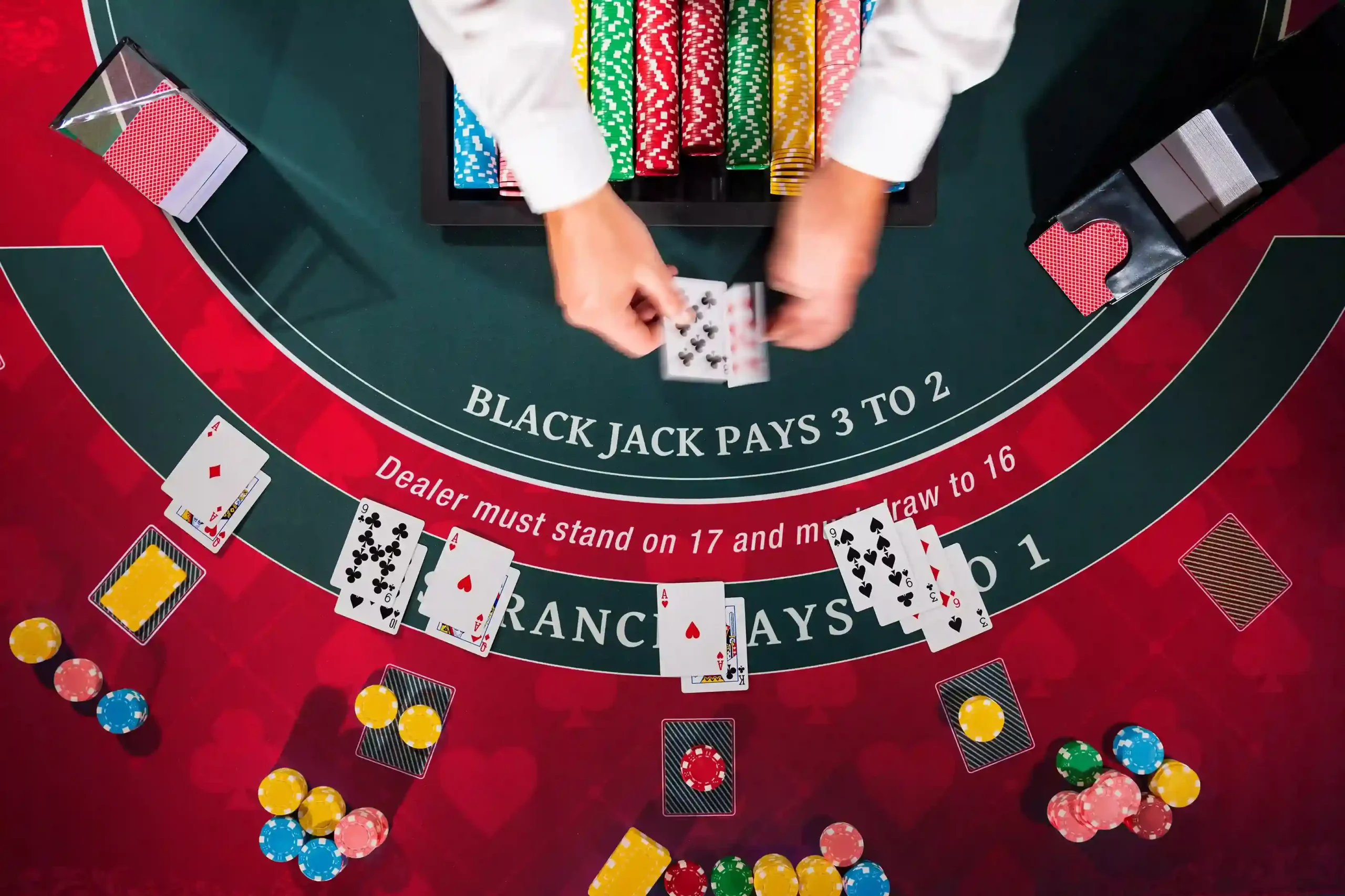Blackjack, also known as 21, is one of the most popular card games in casinos worldwide. Its allure lies in the blend of skill and chance, where players try to beat the dealer by forming a hand worth 21—or as close to it as possible—without going over. Whether you’re a total newbie or just curious about why this game is so beloved, this guide will walk you through the essentials with a friendly, easy-to-follow approach.
The Basics of Blackjack
At its core, blackjack is a battle between you and the dealer. It’s not about competing with other players but about who can achieve the better hand.
Objective:
The goal is to have a hand value closer to 21 than the dealer without exceeding it.
Card Values:
- Number cards: Face value (e.g., a 5 of Hearts is worth 5).
- Face cards (King, Queen, Jack): Worth 10 points each.
- Aces: Worth 1 or 11 points, depending on which benefits the hand more.
How to Play Blackjack: Step-by-Step
- Place Your Bet:
Start by placing chips in the betting circle. This is your wager for the round.
- Get Your Cards:
The dealer gives each player two cards, face-up, and takes two cards themselves (one face-up, one face-down).
- Assess Your Hand:
Look at your hand’s total value. If you have an Ace and a 10-value card (e.g., a King), you’ve hit blackjack!
- Choose Your Move:
Based on your hand and the dealer’s face-up card, you decide how to proceed:
- Hit: Ask for another card to improve your total.
- Stand: Keep your current hand and end your turn.
- Double Down: Double your initial bet and take exactly one more card.
- Split: If you have two cards of the same value, you can split them into two separate hands (requires an additional bet).
- Surrender: Forfeit half your bet and end the round (available in some games).
- Dealer’s Turn:
Once all players have finished, the dealer reveals their face-down card and plays their hand according to strict rules (e.g., hitting on 16 or less, standing on 17 or more).
- Determine the Winner:
If your hand is closer to 21 than the dealer’s, you win! If the dealer busts (exceeds 21), all remaining players win.
Tips and Strategies for Beginners
1. Learn Basic Strategy:
Blackjack isn’t just about luck; using a basic strategy chart can significantly improve your odds. These charts show the mathematically optimal decision for every possible hand you might have.
2. Pay Attention to the Dealer’s Card:
The dealer’s upcard is a crucial clue. For example, if they have a 4, 5, or 6, they’re more likely to bust, so you might play conservatively.
3. Avoid Insurance:
Insurance is a side bet offered when the dealer’s upcard is an Ace. While it sounds tempting, it’s generally not a good bet statistically.
4. Set a Budget:
It’s easy to get caught up in the excitement. Decide how much you’re willing to spend before sitting down at the table and stick to it.
5. Practice Makes Perfect:
Before heading to a casino, try free online blackjack games to get a feel for the rules and strategies.
Unique Insights Into Blackjack
- The House Edge Is Manageable:
Unlike many casino games, blackjack offers one of the lowest house edges (around 0.5% with basic strategy). This means you’re playing a game with relatively fair odds.
- It’s a Social Game:
While you’re technically playing against the dealer, the communal table atmosphere often leads to camaraderie among players.
- Card Counting Isn’t Illegal, But…:
If you’ve seen movies like 21, you know about card counting. It’s a legal strategy, but casinos frown upon it and may ask you to leave if they suspect you’re doing it.
- Blackjack Is Great for Beginners:
Unlike poker, which has a steep learning curve, blackjack is simple to learn but offers enough depth to keep you coming back.
- Online Blackjack Is Thriving:
If you’re not ready to hit a casino, online blackjack games are a fantastic way to practice and enjoy the game from home.
FAQs About Blackjack
1. What happens if my hand exceeds 21?
If your hand’s total value exceeds 21, it’s called a bust, and you automatically lose the round, regardless of the dealer’s hand.
2. Can I play blackjack online?
Absolutely! Many reputable online casinos offer blackjack, with options ranging from single-player games to live dealer tables.
3. What’s the difference between “hard” and “soft” hands?
- A hard hand doesn’t include an Ace or includes one that counts as 1 (e.g., 10+7 = 17).
- A soft hand includes an Ace that counts as 11 (e.g., Ace+6 = Soft 17).
4. Should I always split pairs?
No. Splitting depends on the pair and the dealer’s upcard. For example, always split Aces and 8s but never split 10s.
5. Is blackjack a game of luck or skill?
It’s both! Luck determines which cards you’re dealt, but skill and strategy influence how well you play those cards.
Final Thoughts
Blackjack is more than just a casino staple—it’s a game of strategy, excitement, and possibilities. Whether you’re playing casually with friends or aiming to master the tables, the key is to understand the rules, stick to a strategy, and have fun.
So, grab a seat at the table and start your blackjack journey. Who knows? The next hand might just be your lucky one. Good luck!
Hari
Hariom Patidar has been working in digital marketing for 3 years. He loves using online tools to make great campaigns for businesses. Hariom is really good at what he does and has helped many companies get more people to know about them online. When he’s not busy with work, Hariom likes to learn about new things in marketing.
